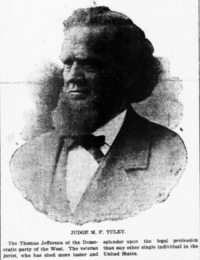Murray F. Tuley
Murray F. Tuley was born in Louisville, Kentucky in 1827. He was a veteran of the Mexican-American War. Tuley became a judge, one of the best known jurists in the West. Tuley was known as the "Nestor" of the Chicago bench. He was president of the Illinois State Bar Association 1902-1903. He was married to Katherine E. Tuley.

The Northwest Division High School in Chicago was renamed in 1917 to Murray F. Tuley High School, after Judge Murray F. Tuley who had risen to fame not only as a judge, but as the author of the State of Illinois's Act of the Incorporation of Cities.
The expansion of Murray F. Tuley High School was completed in 1919 and, again, the school became one of the most modern high schools with new classrooms, laboratories, gymnasiums, swimming pool, shop rooms and one of the largest assembly halls in the city, seating 1,500 people. Tuley High School was one of the best academic high schools in the city and the scholastic laurels won by its students were many. The main goal of the school was to produce scholars.
M.F. Tuley owned a farm on Pine Lake which is now in Chenequa, Wisconsin. There is a spring on the property and for a period of time, he sold bottle water through the Che Ne Qua Co.(see adveritsement in cookbook)[1] His farm was later sold and Became Wilson's Chenequa Springs Hotel and was later sold to Jacob Elias Friend. This land is of historical significance because it was known muskrat hunting ground of the Prairie Potawatomi (Mashko- tens) Menomini and Chippewa Indians. The area is referred to as Tuley's Bay and also Wilson's Bay where there is reedy marsh extending from opposite the Chenequa hotel property southward across the bay to the wooded Niedecken point.[2] The Indians called the springs, "Tkepmbes" or "springs at the lakes."
Personal Life
Murray Tuley was married to Katherine E. Tuley. She also went by the names: Kate Tuley, Kate E. Tuley, Mrs. M. F. Tuley, Katherine Edmonson, and Mrs. Murray F. Tuley.
She is known for assistance in establishing kindergarten in the public school system in Chicago, Illinois.[3][4] She did this through her involvement in the Chicago Women's Club of which she was a charter member.[5] She secured aid through the Froebel Kindergarten Association.[6] to help fund Arnold Street Free Kindergarten, May 21, 1884 [7] and was a member of the Froebel Kindergarten Association Executive Committee.[8][9]
She founded the School Children's Aid Society in 1889 after law on compulsory education was enacted.[10]
In 1893 she was a member of Kindergarten Congress.[11]
Death
He died in the Pennoyer Sanitarium in Kenosha, Wisconsin in 1905. His death was attributed to nervous exhaustion, the result of overwork. Tuley Park in Chicago and Tuley High School were named after Judge Tuley.
References
- ↑ http://blog.survivorlibrary.com/library/175_choice_recipes_mainly_furnished_by_members_of_the_chicago_womens_club-1887.pdf
- ↑ http://www.ebooksread.com/authors-eng/wisconsin-natural-history-society-archeological-s/the-wisconsin-archeologist-volume-8-10-hci/page-32-the-wisconsin-archeologist-volume-8-10-hci.shtml
- ↑ http://archive.org/stream/annalsofchicagow00chic/annalsofchicagow00chic_djvu.txt
- ↑ Chicago Woman's Club (Chicago, Ill.) (1890). [http://books.google.com/books?>id=YnkqAAAAYAAJ Chicago Woman's Club]. The Club. p. 43.
- ↑ staff (November 3, 1910). "Obituary Mrs. Murray F. Tuttle". Waukesha Freeman. p. 5. Retrieved 9 July 2014.
- ↑ http://archive.org/stream/annalsofchicagow00chic/annalsofchicagow00chic_djvu.txt
- ↑ http://archive.org/stream/annalsofchicagow00chic/annalsofchicagow00chic_djvu.txt
- ↑ Official Report of the Proceedings of the Board of Education of the City of Chicago. Chicago Board of Education. January 25 1888. p. 125. Check date values in:
|date=(help) - ↑ http://lincoln.lib.niu.edu/cgi-bin/philologic/getobject.pl?c.5765:9.lincoln
- ↑ http://libsysdigi.library.uiuc.edu/oca/Books2007-09/handbookofcharit00vish/handbookofcharit00vish_djvu.txt
- ↑ The Kindergarten for Teachers and Parents. Alice B. Stockham & Company. 1892. p. 746.
- Middletown Daily Press, Middletown, New York, December 26, 1905, Page 5.
- http://www.tuley.us/TuleyNew/b128.htm#P131